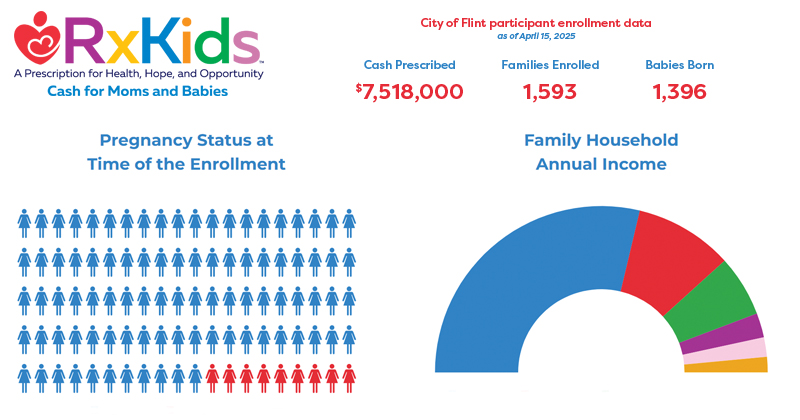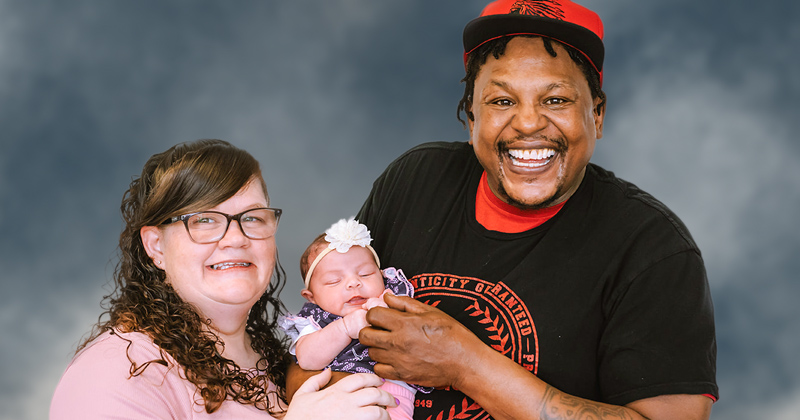
Almost daily, Dr. Mona Hanna hears from cities hoping to be just like Flint.
“Instead of being associated with the water crisis, how wonderful is it to hear that other cities in Michigan and across the nation want to follow in the footsteps of what Flint started with Rx Kids?” said Hanna, a Flint pediatrician, Michigan State University professor, and director of Rx Kids.
Launched in 2024 in Flint, Rx Kids is the nation’s first-ever, community-wide program to “prescribe” direct cash payments to mothers during pregnancy and throughout the first year of their child’s life.
More potent than any prescribed pill, it aims to reduce childhood poverty and build stronger, healthier communities.
The program is making great strides.
As of April 15, Rx Kids has already served nearly 1,600 families in Flint and provided more than $7.5 million in cash payments to support moms and 1,396 babies.
It’s also proving to be a shot in the arm for Flint’s economy. According to a report from the Flint & Genesee Group, the $ 7.5 million Rx Kids cash payments have made an estimated $11.8 million total economic impact in the city of Flint.

“This report confirms Rx Kids is not only improving the lives of Flint’s children, it’s also boosting our local economy,” said Tim Herman, CEO of the Flint & Genesee Group. “It’s more than just a health program; it has real economic benefit.”
Because having babies isn’t cheap.
Due to a decrease in income during pregnancy, the additional expenses of a newborn, and the absence of paid maternity leave for many mothers, poverty spikes to its highest rate at childbirth and through the first year of life.
The situation is dire in Flint, which has the highest child poverty rate in the nation at 59%. For families with young children under 5, the poverty rate is even greater at 62%, according to 2023 U.S. Census American Community Survey data.
The lingering impacts of poverty on children’s health cannot be underestimated. Studies consistently show that growing up in poverty puts children at a higher risk for a wide range of cognitive, emotional, social, and health-related issues.
“If we don’t support families, especially in early childhood, we’re shooting ourselves in the foot,” Hanna said.
“Those kids are going to be sicker. They’re going to have more problems in school. They’re going to have decreased economic productivity. And we’re going to pay for all that in special education, criminal justice, healthcare costs, and decreased economic productivity.”
Investing in the well-being of our youngest residents can have long-term positive effects and break the cycle of poverty, experts say.
“That’s why it’s imperative we invest in our children from the very beginning of their lives,” said state Sen. John Cherry, D-Flint. “By lifting mothers and babies out of poverty, we are also investing in a brighter future for Flint for generations to come.”
Through public funding and private philanthropy, Rx Kids has raised over $100 million so far – including $44.8 million for Flint’s program.
In Flint, moms enrolled in Rx Kids receive a total of $7,500 in cash, including a one-time payment of $1,500 during mid-pregnancy followed by $500 each month until the child turns 1.
All pregnant women and infants who are residents of the city of Flint are eligible for the program, regardless of the mother’s or family’s income. Families can spend the money in whatever way they think is best, with no strings attached.
The program is already changing lives and communities – and becoming a model for the nation.

Based on participant surveys and research data, Flint moms and babies enrolled in Rx Kids fared better in 2024 than in previous years or in nearby communities.
“Families who have historically faced economic uncertainty now have a lifeline that helps them manage everyday expenses,” said state Rep. Julie Rogers, D-Kalamazoo, where Rx Kids recently launched. “For many, the program creates a foundation of stability, giving them the chance to focus on their children’s well-being and development.”
Rx Kids is a program of Michigan State University Pediatric Public Health Initiative, in collaboration with Poverty Solutions at the University of Michigan, and administered by the international leader in cash transfers, GiveDirectly.
Hanna spearheaded the initiative after witnessing the tremendous success of the 2021 expanded Child Tax Credit that lifted millions of American children out of poverty.
To support Rx Kids, the State of Michigan leveraged the flexibility of Temporary Assistance for Needy Families (TANF) block grant dollars to support the program in Flint and recently added dollars to expand it across Michigan.
Rx Kids is now available to families in Kalamazoo, the Eastern Upper Peninsula, and Pontiac with other communities in Michigan and nationwide taking notice.
The program has proven popular on both sides of the political aisle.
“Making sure that children grow up in an environment where their needs are met should not be a partisan issue,” said state Rep. Phil Green, R-Lapeer. “Ensuring that babies have clean, fresh diapers, safe car seats, and safe sleeping arrangements are key to their development in life.”
Its economic value manifests itself in many ways.
“When we survey families, the top five ways they are spending this money is on baby supplies, and then for food, rent, utilities, and transportation,” said Luke Shaefer, co-director of Rx Kids and the Hermann and Amalie Kohn Professor of Social Policy at the University of Michigan.
“Most of the time, that money is spent right in their hometown, which ultimately benefits everyone in the community.”
In addition to helping moms meet basic financial needs and buy things they need for their babies, there have been other positive outcomes, said Ridgway White, president and CEO of the Charles Stewart Mott Foundation, which granted $15 million to Michigan State University to support Rx Kids.
“Among Flint moms participating in Rx Kids, none were evicted from their homes, moms got to prenatal care sooner and more often, and trust in health care and the government improved,” White said.
Participants also reported better access to food and improved maternal mental health, including reduced postpartum depression.
In terms of housing security, Rx Kids families saw a marked improvement in the likelihood that they were paid in full (not behind) on their rent or mortgage – and a large reduction in how much they owed if they were behind. In contrast, both housing stability outcomes worsened for non-Flint families between 2023 and 2024.
“Every day, it’s improving family financial security by helping people keep a roof over their heads, buy food and diapers and car seats, and keep the car running to get to doctor appointments,” Hanna said.
Child cash benefits are exceptionally common worldwide, but not in the United States, according to a December 2024 article in The Lancet medical journal that Shaefer and Hanna helped co-author.
More than 140 countries in every region of the world have adopted large-scale, government-funded child cash benefit programs, many of which have been in operation for years or decades.
And they work.
The benefits are an investment in the health, prosperity, and global competitiveness of a nation, with a key objective to prevent and reduce child poverty, according to the authors.
“We have a lot of evidence that fits with exactly what we’re seeing so far with Rx Kids: Families spend their benefits on necessities – and they tend to spend it locally,” Shaefer said.

Flint’s Angela Sintery is proof Rx Kids makes a difference.
Sintery has a bachelor’s degree in education and has worked for 13 years as a teacher at the University of Michigan-Flint’s Early Childhood Development Center. When she and her partner, Nebertha Caldwell, found out they were expecting a baby, they worried about how they’d make ends meet with the added financial pressure.
Because she lives in Flint, her coworkers told her about Rx Kids.
“I filled out the paperwork on the website and two weeks later the money was in my bank account,” said Sintery, who has also received $500 monthly since the birth of her daughter Jolena Caldwell a year ago.
Even with a full-time career, the extra money from Rx Kids payments made a huge difference to her family.
“My older daughter was already graduating from high school when I had Jolena, so I didn’t have any of the supplies you need for an infant,” she said. “We were able to buy things like a car seat, a bathtub, and clothes without worrying all the time.”
Sintery tries to spend her payments locally, shopping at the Flint Farmers’ Market for fruits and vegetables whenever possible. Earlier this year, Rx Kids dollars went toward car repairs at a local garage and replacing the faulty plumbing in her kitchen sink.
“That extra money’s been a real blessing,” Sintery said.
Hanna is thrilled with the program’s success in Flint and its expansion across the state. She looks forward to Rx Kids empowering more moms, more babies, and more communities in the coming months and years.
“Every day, every hour that a baby is born into poverty is a failure on all of us,” Hanna said. “We’re proving in Flint that we can do better as a society.”
